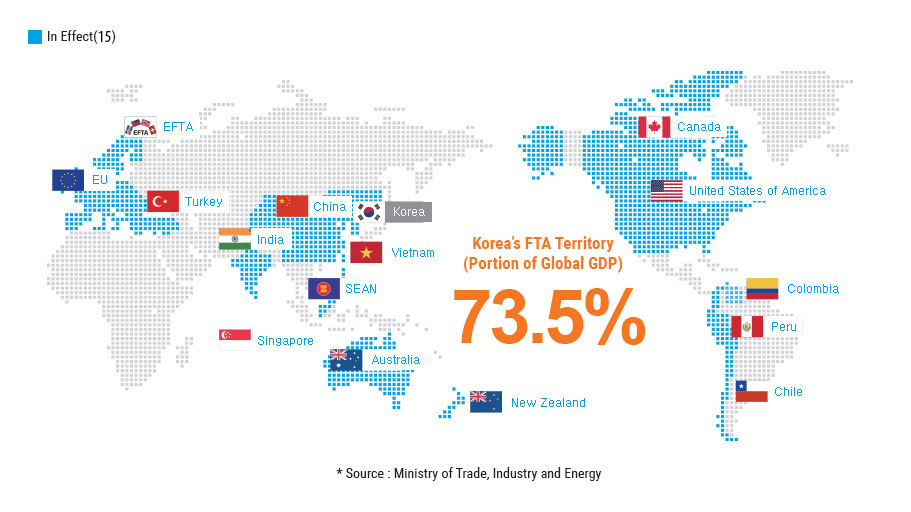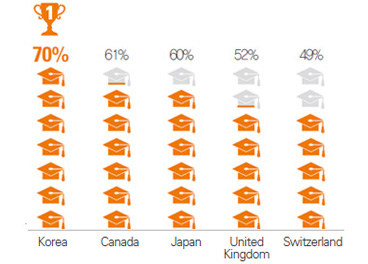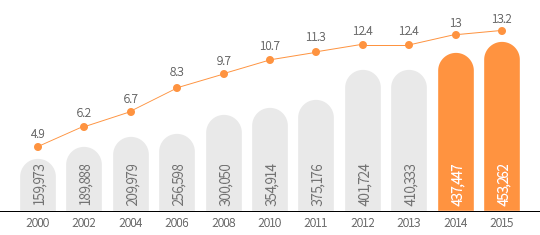Investment Attraction of Korea
Korea offers an optimal business environment, with 50 million people, 1.2 trillion in GDP, free trade deals with the world’s top three economies, and globally competitive human resources and infrastructure.
Best location for breaking into Northeast Asian market
Korea is located at the center of Northeast Asia, which is emerging as the world’s third-largest economic region. Situated between the world’s second-largest economy China and the third, Japan, there are 147 cities with a population of over 1 million within a three-hour flight of Korea. This puts it in the most effective geographical place to break into the Northeast Asian market of 1.6 billion consumers.

Strong FTA networks with major economies
The Korean market is the most attractive business hub in the world. It is the first Asian country that has concluded free trade agreements with the EU(2011) , the U.S.(2012) and the China(2015). It has FTAs with 52 countries in the world as of 2018, and the combined GDP with those countries amounts to 73.5 percent of world’s GDP. With the signing of an FTA between Korea and China, global investors are able to occupy the Chinese market in advance through Korea, and Chinese companies can reach out to the world market through Korea.

World’s most innovative country in ICT
Korea ranked first in Bloomberg’s 2019 Global Innovation Index among the world’s 50 most innovative countries countries in the world. The nation is a pioneer in information and communications technology as well. Korea ranked the second in the International Telecommunication Union’s global ICT Development Index among 176 countries in 2017, Such innovative ICT competitiveness offers the best opportunity for convergence in various sectors including finance, manufacturing, logistics, tourism and services. The best examples include successful cooperation between Korean and foreign companies in the manufacture of cars and ships equipped with smart technology. Global research institutes in Korea include Microsoft Mobile Innovation Lab, IBM Ubiquitous Computing Lab, Google Engineering R&D Center, Siemens Medical R&D Center and Institut Pasteur Korea.
Globally competitive industries
Korea has global competitiveness in diverse industries. Korean companies are world leaders in semiconductors, display, smartphones, shipbuilding, lithium battery, LEDs and steel. 233 of the world’s 500 largest companies compiled by Fortune magazine have already made inroads into the Korean market.
- Semiconductors 1st(73.1%)
- Smartphones 1st(21.1%)
- Display 1st(44.5%)
- Chemicals 1st(67.5%)
- Steel 1st(48.2%)
- Lithium battery 1st(38%)
Korea's global market share by industry as of 2013
Logistics, as intricate as a spider’s web
Korea’s Incheon International Airport offers direct flights to 175 cities through 83 airlines. As the world’s second-largest airport in international freight, the Incheon airport topped the Airport Service Quality survey for the 10th year in a row in 2014. Korea’s main seaport in Busan offers regular containership services to 536 ports worldwide, including 78 in China and 84 in Japan.
Highly skilled manpower
Korea’s highly skilled manpower will support successful businesses for global investors. A whopping 75 percent of a sample of 200 foreign companies in operation in Korea said Korean people had a strong sense of sincerity and responsibility. The percentage of college graduates among those aged between 25 and 34 is 70 percent, the highest among OECD member nations. The R&D workforce has also continued to increase for the past 10 years.

OECD Top-5 College Graduation Rate in 25-34 Age Group

Growth Rate in Korean R&D Workforce

